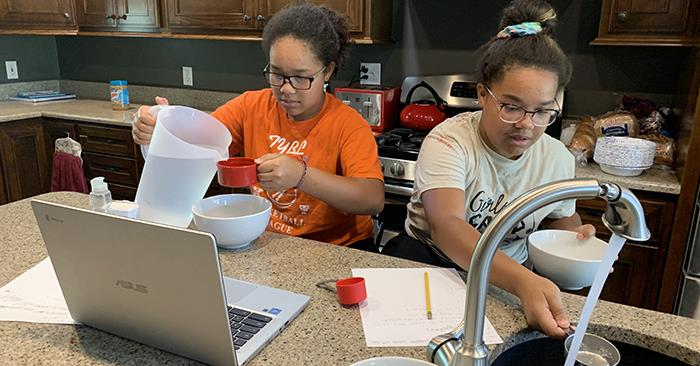Virtual Summer Program Engages Local Children, Gives MAE Students Experience

Makayla (left) and Mackenzie Smith work on a science experiment during the Virtual Summer Enrichment Program. Truman partnered with the Kirksville R-III School District to provide educational opportunities in an alternate format since traditional summer school courses were suspended due to the coronavirus. Thirty-one MAE students were also able to gain teaching experience through the program.
For a variety of reasons, summer school has grown increasingly more important. The Kirksville School District typically offers a full-day program for 24 days that provides students with an extensive, engaging curriculum and offers incentives to attend. It also doubles as a valuable exercise for Truman Master of Arts in Education students to work side by side with professional teachers.
“This has always provided a great learning opportunity for our students and teachers, as well as the Truman students,” said Tricia Reger, assistant superintendent for the Kirksville School District. “We held out hope that our summer program could go on as planned, until mid-May when it became obvious that was not going to happen.”
District administrators, along with representatives from Truman’s Education Department, devised a solution that involved equal parts cutting-edge technology and a centuries-old approach to education.
“As we were talking, we brainstormed hosting a virtual one-room schoolhouse so the whole family could join,” said Wendy Miner, department chair and professor of education. “We were not sure how many families would be interested. We had more interest than we expected, so we opened it up to more families.”
Quickly born out of necessity, the Virtual Summer Enrichment Program offered area K-8 students, along with their family members, an hour of themed learning every day for a week. The 31 participating MAE students were divided into teams, and each team was responsible for two families per week for three weeks.
Kneka Smith enrolled her daughters Makayla and Mackenzie to keep their minds engaged during a summer void of their normal activities. Although they signed up for one week, the girls begged to do a second.
“The teachers took them on a learning journey that included leading math, science and writing lessons. They demonstrated excellent active learning techniques for online instruction and the girls engaged,” Smith said. “The girls were reminded that learning should be fun and it can happen remotely.”
For the MAE students, although they were spending two hours a day working directly with students and families, a considerable amount of work went into pulling the Virtual Summer Enrichment Program together. For one thing, they had to be prepared to teach a wide range of ages since children participated as families, not pre-sorted classrooms. The MAE students had their own class in the morning, as well as a one-hour seminar after each daily session. Like a traditional summer, they were observed by Education Department faculty, and this year MAE alumni were also contacted to serve as mentors to the aspiring teachers.
“This experience taught me a lot about flexibility, individualization and building relationships,” said Courtney Atwell, a Truman MAE student. “Having this experience with a short-notice change has given me the opportunity to be innovative and exercise a different side of educating than I would get in a classroom field experience.”
Going into the Virtual Summer Enrichment Program, Atwell had concerns about challenges in communicating with her students and colleagues, as well as with the technological familiarity needed to be successful, not to mention learning a completely new way of teaching with very little time to prepare. What seemed like adversity in the beginning she now views as opportunity.
“I am so grateful for all of these challenges because they have helped me grow professionally and personally,” Atwell said. “Having this experience where various skills are unexpectedly called upon has given me the opportunity to learn more about myself and use that to benefit my educating abilities.”
Fellow MAE student Hayley Brotherton thought it might be difficult to maintain students’ attention while teaching virtually, but that proved not to be an issue.
“We discovered that if students are interested in the content being taught they will stay on the screen,” Brotherton said. “At the end of every week, there was not a single student who wanted the week to end. For students that are spending an hour of their summer day online in summer school, I took that as a huge compliment.”
Parents seemed to be actively engaged too, a side benefit Brotherton noted would not have been available under normal conditions.
“During the week we often received emails from parents sharing how much their student was enjoying the course, and they would even share pictures of their students’ work,” she said.
By all accounts, the Virtual Summer Enrichment Program was a success, especially considering it was created on short notice in a format unfamiliar to most educators and students. Nearly 100 children from 57 families participated in the event.
“It was a win-win,” Miner said. “Students in K-8 had an opportunity for enrichment this summer, parents had an opportunity to learn with their kids if they wanted to do so, and our students practiced teaching.”
The Kirksville School District plans to resume in-person classes in some format in August. With the coronavirus continuing to create uncertainty, exactly what education looks like in the near future is still unclear. An added value of the Virtual Summer Enrichment Program may be the role it has in shaping the future of teaching.
“This, combined with all our teachers learned as they educated virtually this past spring, will all prove to be very valuable feedback as we plan for what is ahead,” Reger said. “I especially found the team teaching concept Truman used during the summer to be a great take away for us at Kirksville R-III. I believe this will provide our teachers more support and options in a virtual learning setting.”

